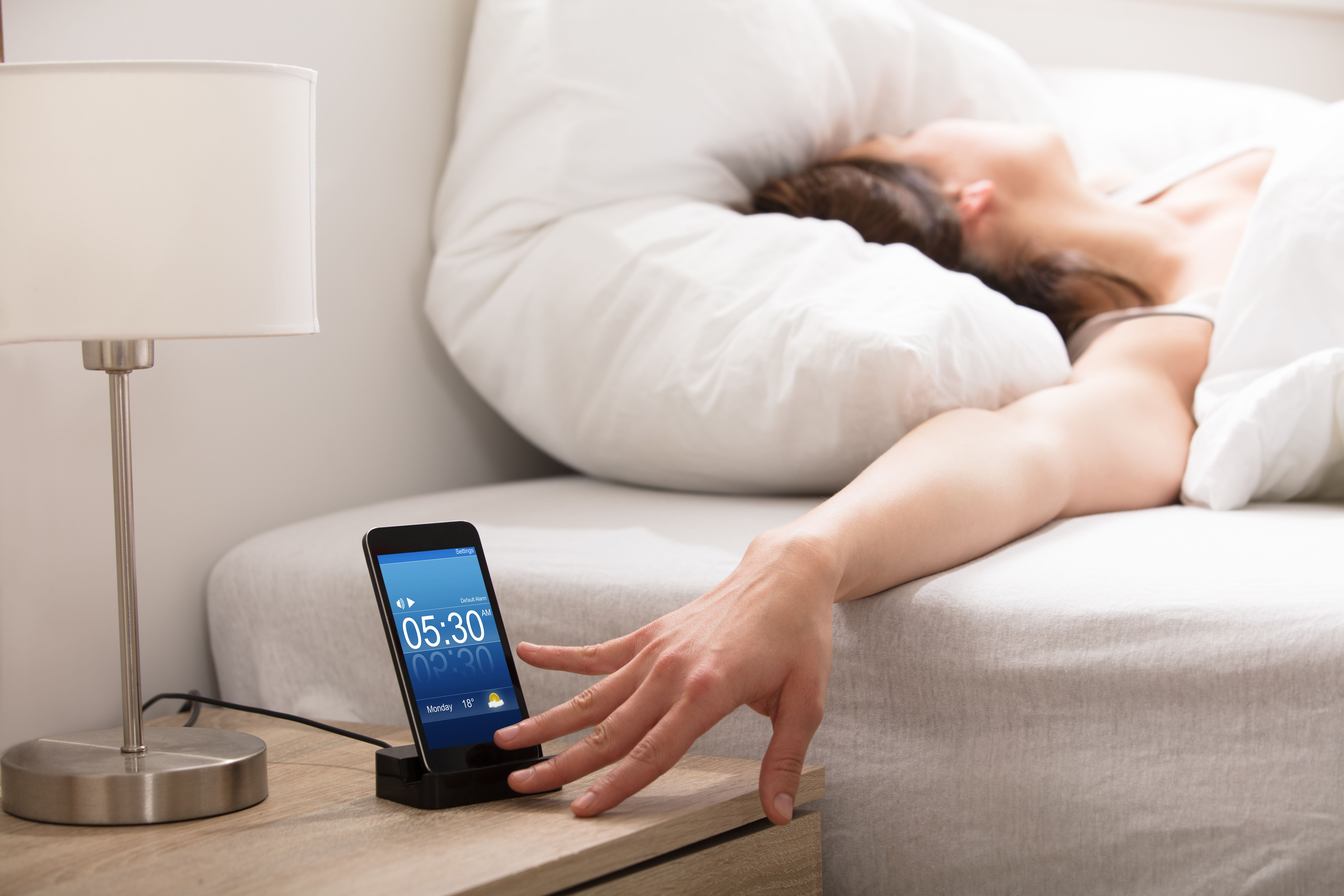- Center on Health Equity & Access
- Clinical
- Health Care Cost
- Health Care Delivery
- Insurance
- Policy
- Technology
- Value-Based Care
Hitting Snooze Can Improve Wakefulness Without Compromising Sleep
A pair of studies found the common morning ritual of hitting the snooze button doesn't dilute the quality of sleep and can improve cognitive function after awakening.
Woman turning off alarm
Image credit: Andrey Popov stock.adobe.com

In recent research, dual results suggested that a brief alarm “snooze” might effectively mitigate sleep inertia, the groggy feeling experienced upon waking, without substantially disturbing the overall sleep pattern. These findings hold particular relevance for late chronotypes and individuals prone to morning drowsiness.
The results of a pair of studies, published in Journal of Sleep Research investigated the common morning ritual of hitting the snooze button. Despite the prevalence of this practice, little was understood about it until now. The investigators conducted 2 comprehensive studies to unravel the predictors and effects of snoozing.
The Prevalence and Implications of Hitting Snooze
In the first study, involving 1732 participants, respondents were questioned about their waking habits. The findings demonstrated that snoozing is widespread, particularly among younger individuals and “night owls”, or those with later chronotypes. Additionally, individuals who indulged in snoozing reported experiencing morning drowsiness and tended to have shorter sleep durations.
Of the participants, 1195 respondents (69%) reported snoozing, or setting multiple alarms, was a common practice, occurring at least “sometimes.” Among these individuals, 71% snoozed on workdays, 23% snoozed on both workdays and days off, and 60% reported falling asleep between alarms “most often” or “always.”
On average, snoozers spent approximately 22 minutes (SD, 17) snoozing each morning, with intervals between alarms averaging 8 minutes (SD, 5).
Comparisons were made between those who snoozed (n = 1195) and those who used an alarm but “never” snoozed (n = 287). Snoozers were found to be, on average, 6 years younger than non-snoozers and nearly 4 times more likely to be evening types.
Additionally, snoozers had a slightly shorter sleep duration on workdays, averaging 13 minutes less compared with non-snoozers. There was no significant difference in sleep duration on days off.
While reported sleep quality did not differ between the 2 groups, those who snoozed were 3 times more likely to feel mentally drowsy upon waking. The study did not find a significant difference in snoozing behavior between genders.
Snoozing, Sleep Quality, and Cognitive Performance
The second study took a more intricate approach, involving 31 habitual snoozers aged 27.5 years (SD, 6.7) in a laboratory setting with polysomnography, a method that records brain waves, oxygen levels, and other vital signs during sleep. The results revealed that a 30-minute snooze period upon waking either improved or had no impact on cognitive performance when compared with abrupt awakenings.
Participants were screened based on their snoozing habits and were required to snooze 2 or more times per week. The study involved 2 waking conditions in a counterbalanced order: snooze and no snooze, with participants maintaining their habitual sleep time.
The snooze condition involved participants hitting snooze every 9-10 minutes for 30 minutes before their final waking, while in the no snooze condition, participants woke abruptly without snoozing. Participants underwent cognitive tests, mood assessments, and cortisol measurements upon waking and 40 minutes later. Sleep architecture was monitored using polysomnography.
During the specific 30-minute period prior to final waking, snoozing induced several sleep architecture changes compared with the no snooze condition. Snoozing resulted in less sleep time, more arousals, and lower sleep efficiency.
Participants in the snooze condition experienced more stage N1 sleep and less REM sleep. Notably, no participant experienced slow-wave sleep (N3) during the snooze period.
Cognitive performance improved with time awake, indicating sleep inertia. Snoozing reduced the inertia effect, with participants performing better on arithmetic speed, episodic memory, and cognitive conflict cost in the Stroop test. However, these effects disappeared after 40 minutes.
With snoozing, there was no effect on working memory or behavioral adjustment in the Stroop test. Cortisol levels increased with time awake, but snoozing did not significantly influence cortisol response.
Snoozing had no substantial impact on cognitive performance, sleepiness, or mood during lunchtime or in the afternoon. These findings suggest that snoozing, despite altering sleep architecture, might mitigate sleep inertia temporarily, improving certain aspects of cognitive performance upon waking, but the benefits diminish relatively quickly.
According to the results, snoozing for 30 minutes in the morning had minor effects on overall sleep but helped avoid waking up from deep slow-wave sleep. While snoozing didn't significantly impact sleep or the mood of individuals, it appeared to be beneficial in reducing sleep inertia, and potentially enhancing cognitive function immediately after waking up. This suggests that snoozing might serve as a strategy to alleviate grogginess upon waking and improve cognitive performance right after getting out of bed.
Reference
Sundelin, T., Landry, S., & Axelsson, J. (2023). Is snoozing losing? Why intermittent morning alarms are used and how they affect sleep, cognition, cortisol, and mood. Journal of Sleep Research, e14054. https://doi.org/10.1111/jsr.14054
The Breakdown: Breast Cancer Research Awareness Day
August 19th 2025Breast cancer is the second most common cancer among women and the second leading cause of cancer-related deaths among women in the US. In light of Breast Cancer Research Awareness Day, The American Journal of Managed Care® breaks down the most recent advancements in breast cancer prevention, screening, and therapies.
Listen
